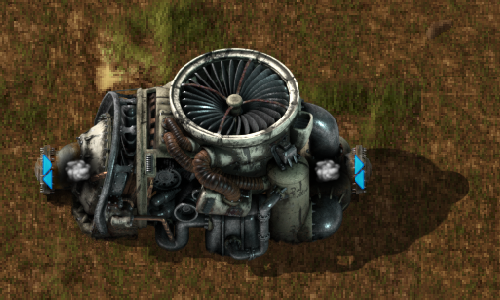Steam turbine
| Steam turbine |
|
Recipe |
|
| + + + → | |
|
Total raw |
|
| + + |
|
Recipe |
|
| + + + → | |
|
Total raw |
|
| + + |
|
Map color |
|
|
Fluid storage volume |
200 |
|
Health |
300 |
|
Resistances |
Fire: 0/70% |
|
Stack size |
10 |
|
Dimensions |
3×5 |
|
Power output |
5.82 MW |
|
Maximum temperature |
500 °C |
|
Fluid consumption |
60/s |
|
Mining time |
0.3 |
|
Prototype type |
|
|
Internal name |
steam-turbine |
|
Required technologies |
|
|
Produced by |
|
The steam turbine consumes steam to create electric energy. It is usually used together with heat exchangers and a nuclear reactor.
While designed for the 500°C steam of a nuclear reactor, turbines can still be connected to boilers for use in conventional 165°C steam power. At this mode, the steam turbine acts equal to two separate steam engines, producing 1800 kW and consuming 60 steam/sec. However, actual power production is based on the temperature of the steam, not the building itself. This means that using a steam turbine is no more fuel-efficient than using two steam engines. Unless saving space within a large build, it is not necessary to use the more costly turbines for boiler steam.
Power output
Each Steam turbine takes a maximum input of 60 units of 500°C steam per second and outputs 5.82MW of electricity; the 5.8MW listed on the tooltip is rounded.
- Heat exchanger heats 15°C water to 500°C steam;
- It takes 0.2 kJ of burner energy to raise 1 water 1°C;
- Steam is consumed by steam turbines at a rate of 60 units of water per second;
- (500°C - 15°C) × 0.2 kJ × 60 units = 5820 kW, or 5.82 MW.
- On the other hand, the calculation for the Boiler-generated steam is: (165°C - 15°C) × 0.2 kJ × 60 units = 1800 kW, or 1.8 MW.
History
- 0.15.0:
- Introduced
